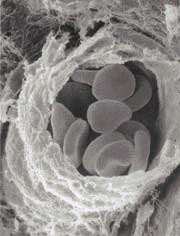Thicker than blood
 the possibility of developing a universally acceptable blood type has risen following the coating of red blood cells with a polymer. Researchers from the Baylor College of Medicine, Houston, and the Albany Medical College, New York, achieved this by disguising the red blood cell surface with polymer coatings. Such a blood cell would help make a blood sample suitable to all patients irrespective of their blood group. Moreover, checking of blood group before administering it would be avoided if polymer-coated cells can be developed to achieve a universal blood type ( New Scientist , Vol 154, No 2082).
the possibility of developing a universally acceptable blood type has risen following the coating of red blood cells with a polymer. Researchers from the Baylor College of Medicine, Houston, and the Albany Medical College, New York, achieved this by disguising the red blood cell surface with polymer coatings. Such a blood cell would help make a blood sample suitable to all patients irrespective of their blood group. Moreover, checking of blood group before administering it would be avoided if polymer-coated cells can be developed to achieve a universal blood type ( New Scientist , Vol 154, No 2082).
Blood transfusions are essential to save lives and organising donors is a difficult task. Moreover, about 50 per cent of blood received from voluntary donors in India is unsafe, according to a study by Blood Bank Society. In addition, such blood is often expensive, unreliable and may even carry viruses such as hepatitis b or the hiv . In India, the requirement of blood stands at over 40 lakh units every year. Blood banks can supply only 19 lakh units. The universal blood group will reduce the immense pressure on blood banks.
There are over 400 blood groups and it is important for the doctors to know which blood group suits the patients before a transfusion is given. Nearly 45 per cent people belong to the o or a blood groups. Only 8 per cent belong to the b category, and still fewer
